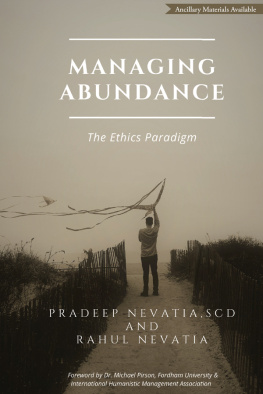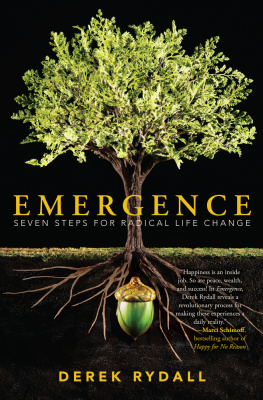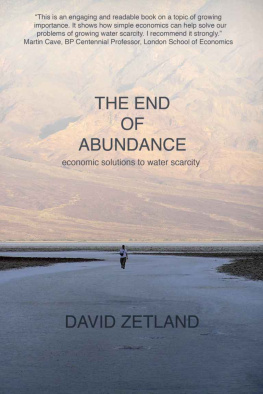Managing Abundance: The Ethics Paradigm
Managing Abundance: The Ethics Paradigm
A Business-like Approach to Demit Scarcity and Admit Abundance
Pradeep Nevatia, scd and Rahul Nevatia

Managing Abundance: The Ethics Paradigm: A Business-like Approach to Demit Scarcity and Admit Abundance
Copyright Business Expert Press, LLC, 2021.
Cover design by Charlene Kronstedt
Interior design by Exeter Premedia Services Private Ltd., Chennai, India
All rights reserved. No part of this publication may be reproduced, stored in a retrieval system, or transmitted in any form or by any meanselectronic, mechanical, photocopy, recording, or any other except for brief quotations, not to exceed 400 words, without the prior permission of the publisher.
First published in 2021 by
Business Expert Press, LLC
222 East 46th Street, New York, NY 10017
www.businessexpertpress.com
ISBN-13: 978-1-95334-970-5 (paperback)
ISBN-13: 978-1-95334-971-2 (e-book)
Business Expert Press Business Ethics and Corporate Citizenship Collection
Collection ISSN: 2333-8806 (print)
Collection ISSN: 2333-8814 (electronic)
First edition: 2021
10 9 8 7 6 5 4 3 2 1
 Dedicated to Saturnrings time principle
Dedicated to Saturnrings time principle
that approbates present, co-terminus with truth.
Description
Indias rural BPO guru Pradeep Nevatia joins with New York-based hedge fund investor Rahul Nevatia to present the until-now abstract concept of abundance through an innovative managing by ethics (MBE) framework that uncompromisingly connects individual self to collective self in self-sustained abundance beyond the hocus-pocus of scarcity. As against the card-carrying management by objectives (MBO) acquirement, the pioneering MBE paradigm sets humannature co-existence as the basis to realize abundance, the source energy of all beings.
The ethicsabundance theme of this book could not be timelier for businesses to reconstruct their growth strategies for a sustainable future following the coronavirus pandemic. The industrial and financial engineering duo has leveraged their respective business turnaround and foot-on-the-gas-pedal backgrounds to thoroughly revamp the contemporary policygoal deployment methodologies and make determined amendments to reconfigure several management processes in vogue to deliver sustainable business results in a meaningfully restructured leadership fellowship relationship dynamic replacing the scarcity-driven everyday mill with natural rhythms of abundance.
Keywords
abundance principle; animative speed; balancing motor; cause and effect; coexistence; cognitive speed; collaboration; collective self; common minimum program; competition; consciousness; constancy; contingency; contingent time; corona effect; cosmic energy; creed hierarchy; deserts of alienation; desire fulfillment; destiny; dignity; dis-values; economic motor; economistic; efficiency; empathy motor; end-state values; entropy; equilibrium; ethics abundance; ethics; abundance; ethics in business; ethics at work; ethicsinertia; ethics paradigm; everyday time; evolution through involution; first thing first; framework for longevity; freedom motor; free will; gaia; gaia system; gaia time; globalization; greed hierarchy; greed maximization; Hawthorne effect; hub and spoke; human flourish; humanistic; humanizing; inertia; intellect; involution; man in human; managing by ethics; managing surprises; Maslows need hierarchy; maximizer; MBE; MBO; meditating on the go; metric for growth; motivating; Narendra Modi; need hierarchy; need optimization; normative speed; oasis of resonance; ordinate goal; period leader; P-O-L-C; P-O-L-S; productivity karma; quality dharma; quality of mind; resonance; rural BPO; scarcity; self-actualization; self-managed; self-realization; serial leadership; slippery slopes; speed-greed; subjective; superordinate goal; sustainability; think and counter think; three-box solution; timeless time; TQM; troika model; universalization; valuator; value sourcing; value as means; vocal for local; work ethic
Contents
It is an irony that my first operational turnaround project at Union Carbides factory in Kashmir Valley coincided with the outset of insurgency in Jammu and Kashmir back in 1989 with mass exodus of Kashmiri Pandits from the valley. As a result, the factory was abandoned, and operations were suspended sine die. I was the head of Industrial Engineering and Operations at the factory. Despite the global standards set by Union Carbide, the factory had a long history of operating at below-par efficiency. However, the relationship between the leadership rank and grassroots workforce was largely cordial, except when it came to delivering efficiency at work! The only tool I had in my learning in those days was my academic knowledge of industrial engineering. I, therefore, deployed my untried and untested knowledge of time and motion studies to examine assembly lines at the factory, admittedly deviating from usual industrial engineering design. My point of interest was not limited to examining the iterative behavior of machines, conveyors, or chutes. I also intended to understand how the man at machine was emotionally reacting and responding to the challenges he was facing to deal with everyday operational issues posed by those machines and auxiliaries. I spent a good 10 hours every day at the factory. But, before I could complete my two-week long study and analyze the data, operational efficiency, which was steadily upping since the beginning of the study, had surpassed the standards set by any of Union Carbides factories in India by the time the study was completed. It was bit of Hawthorne effect of course, but the key takeaway for me was that people matterand matter the most. Everything else could be impersonalized, but not the human. A human is just her emotion, and surely, there is no dominant difference between one and another, but the variance in the way they emote. Emotion is what actually sets the man in motion and regulates his actions in the direction to fulfill his unfulfilled desires.
Anyway, I was out of the frying pan, possibly with flying colors, but put back on fire once again at another one of Union Carbides factoriesthis time in Kolkata, in eastern India. This factory had an interesting organization and work culture. Located in the midst of a highly volatile and charged trade union-driven myth, the workforce was decidedly skilled and largely returned from well-to-do and educated family backgrounds. In other words, they had deep-rooted beliefs, and they believed they knew what ethicallymorally was right or wrong. They also knew how to carry out their assigned tasks in the most efficient way. However, fact remained that barring the early few years since its inception, operations were inefficient and employee relations were largely discordant at most times. As the head of the wage negotiation committee, I had to deal with people who knew more about operations than mehowever, I knew more about my ignorance than they knew about theirs! And here was the catchin the mill of the greedspeed grind, a man gets so fixated to his individualistic desire-fulfillment agenda that he tends to ignore, to his own peril, the collective need-fulfillment purpose that he himself could be a part of. To cut a long story short, for the first time in the factorys history, an agreement was signed between the heretofore warring factions to serve and fulfill a common and collective agenda, and a formula was arrived at, to share the impending gains between the two parties. This was September 1996. As the head of factory by then, I fondly recall the celebrations that commemorated the best productivity milestone ever achieved by the factory. This was the authority of collectivism!













 Dedicated to Saturnrings time principle
Dedicated to Saturnrings time principle